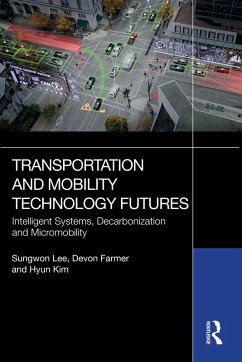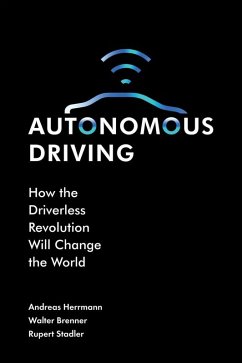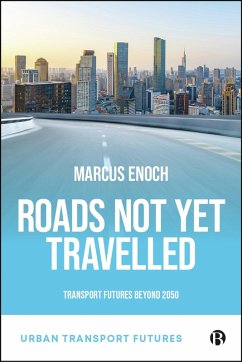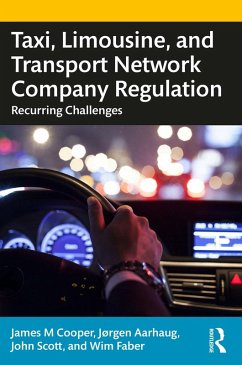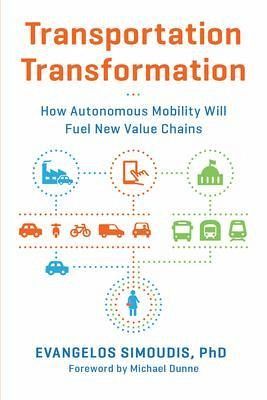
Transportation Transformation (eBook, ePUB)
How Autonomous Mobility Will Fuel New Value Chains
Versandkostenfrei!
Sofort per Download lieferbar
11,95 €
inkl. MwSt.
Weitere Ausgaben:

PAYBACK Punkte
6 °P sammeln!
Transportation Transformation is an indispensable GPS for every automaker, transportation startup, investor, policymaker, or regulator who is planning the future of urban and suburban transit, and anyone else with a need to understand the changing ways in which consumers and goods will get around. When an industry this large changes this rapidly, strategy becomes complex and challenging. Transportation Transformation provides the crucial vision necessary to navigate those changes with confidence.Comprehensive, global, and meticulously researched, Transportation Transformation presents a vision...
Transportation Transformation is an indispensable GPS for every automaker, transportation startup, investor, policymaker, or regulator who is planning the future of urban and suburban transit, and anyone else with a need to understand the changing ways in which consumers and goods will get around. When an industry this large changes this rapidly, strategy becomes complex and challenging. Transportation Transformation provides the crucial vision necessary to navigate those changes with confidence.
Comprehensive, global, and meticulously researched, Transportation Transformation presents a vision of next-generation urban mobility arising from the interplay among three major groups: the automakers, the mobility services companies, and the cities. Transportation's future is subject to consumer shifts, driven by disruptive technology and business model innovations including autonomous or automated, connected, and electrified vehicles; on-demand mobility services, such as ride-hailing and micromobility; and rapidly multiplying new ways to deliver consumer transportation and goods. The book describes the transformations that automakers, mobility services companies, and cities must undertake, the new value chains that will form as a result of these transformations, and the business models that will enable the transformed organizations to monetize or otherwise benefit from next-generation mobility. Transportation Transformation details the central role of data, AI and other data-driven technologies in next-generation mobility and explains the key risks we must address in the process of transforming transportation.
Even as traditional models of vehicle acquisition and ownership weaken, new business models are emerging, including subscription-, merchandising-, and advertising-based revenue streams. Such innovations will remake the staid and traditional value chains that dominate today's transportation markets and create new ones. Transportation Transformation discusses these new models under a variety of implementation scenarios involving automakers, Tier 1 suppliers, mobility services companies, and Internet technology providers. It analyzes the resulting new revenue streams and the value chains that will remake the economics of the automobile industry as well as the broader transportation and goods delivery industries. And it discusses in revealing detail the opportunities and risks ushered in by these shifts and disruptions.
Comprehensive, global, and meticulously researched, Transportation Transformation presents a vision of next-generation urban mobility arising from the interplay among three major groups: the automakers, the mobility services companies, and the cities. Transportation's future is subject to consumer shifts, driven by disruptive technology and business model innovations including autonomous or automated, connected, and electrified vehicles; on-demand mobility services, such as ride-hailing and micromobility; and rapidly multiplying new ways to deliver consumer transportation and goods. The book describes the transformations that automakers, mobility services companies, and cities must undertake, the new value chains that will form as a result of these transformations, and the business models that will enable the transformed organizations to monetize or otherwise benefit from next-generation mobility. Transportation Transformation details the central role of data, AI and other data-driven technologies in next-generation mobility and explains the key risks we must address in the process of transforming transportation.
Even as traditional models of vehicle acquisition and ownership weaken, new business models are emerging, including subscription-, merchandising-, and advertising-based revenue streams. Such innovations will remake the staid and traditional value chains that dominate today's transportation markets and create new ones. Transportation Transformation discusses these new models under a variety of implementation scenarios involving automakers, Tier 1 suppliers, mobility services companies, and Internet technology providers. It analyzes the resulting new revenue streams and the value chains that will remake the economics of the automobile industry as well as the broader transportation and goods delivery industries. And it discusses in revealing detail the opportunities and risks ushered in by these shifts and disruptions.
Dieser Download kann aus rechtlichen Gründen nur mit Rechnungsadresse in A, D ausgeliefert werden.







